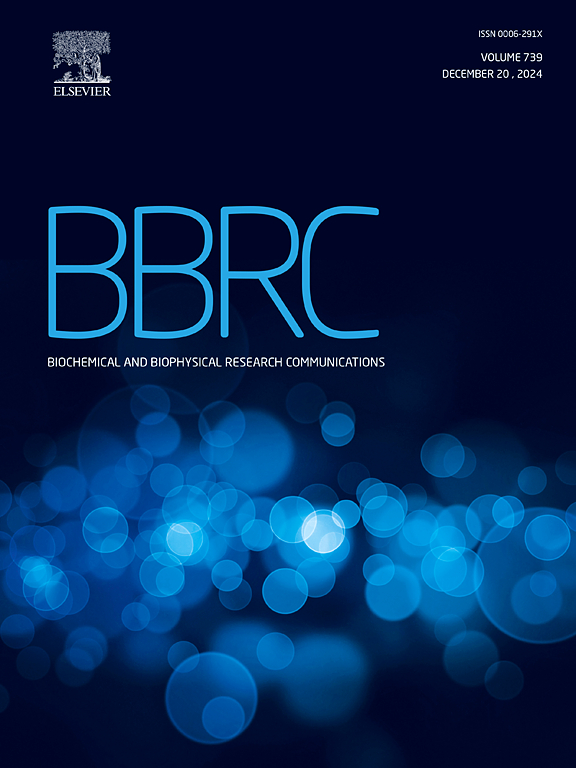超越能量代谢:生酮饮食和β-羟基丁酸通过抗炎和屏障保护作用保护肠道缺血-再灌注损伤
IF 2.5
3区 生物学
Q3 BIOCHEMISTRY & MOLECULAR BIOLOGY
Biochemical and biophysical research communications
Pub Date : 2025-06-18
DOI:10.1016/j.bbrc.2025.152227
引用次数: 0
摘要
肠缺血再灌注损伤(IRI)是一个重大的临床挑战,有效的治疗方法有限。本研究通过小鼠模型和肠道类器官研究生酮饮食(KD)和β-羟基丁酸酯(BHB)对肠道IRI的保护作用。在给予KD或BHB两周后,小鼠进行肠系膜上动脉阻塞(60分钟)和再灌注(4小时)。两种干预措施都显著提高了血液中BHB水平,降低了空腹血糖。KD和BHB可显著减轻肠绒毛损伤,保持上皮屏障功能(E-cadherin, Occludin, ZO-1),维持线粒体完整性,降低炎症因子(IL-6, IL-1β, TNF-α),提高72小时存活率,其中KD表现出更强的疗效。在肠道类器官氧-葡萄糖剥夺模型中,BHB在两种测试浓度(2 mM vs. 5 mM)下表现出不同的保护作用,在细胞活力、结构完整性和炎症反应方面,BHB浓度越高,保护作用越强。这些发现首次证明了生酮干预可以通过多种机制(包括炎症抑制和屏障保护)预防肠道IRI,提示了在肠道IRI预防和管理方面的潜在临床应用,尽管详细的机制阐明需要进一步研究。本文章由计算机程序翻译,如有差异,请以英文原文为准。
Beyond energy metabolism: ketogenic diet and β-hydroxybutyrate protect against intestinal ischemia-reperfusion injury through anti-inflammatory and barrier-preserving effects
Intestinal ischemia-reperfusion injury (IRI) is a significant clinical challenge with limited effective treatments. This study investigated the protective effects of ketogenic diet (KD) and β-hydroxybutyrate (BHB) against intestinal IRI using mouse models and intestinal organoids. Following two weeks of KD or BHB administration, mice were subjected to superior mesenteric artery occlusion (60 min) and reperfusion (4 h). Both interventions significantly elevated blood BHB levels and reduced fasting glucose. KD and BHB markedly attenuated intestinal villous damage, preserved epithelial barrier function (E-cadherin, Occludin, ZO-1), maintained mitochondrial integrity, reduced inflammatory cytokines (IL-6, IL-1β, TNF-α), and improved 72-h survival rates, with KD demonstrating superior efficacy. In intestinal organoid oxygen-glucose deprivation models, BHB exhibited differential protective effects at two tested concentrations (2 mM vs. 5 mM), with enhanced protection at the higher concentration on cellular viability, structural integrity, and inflammatory responses. These findings provide the first evidence that ketogenic interventions protect against intestinal IRI through multiple mechanisms including inflammatory suppression and barrier preservation, suggesting potential clinical applications in intestinal IRI prevention and management, though detailed mechanistic elucidation requires further investigation.
求助全文
通过发布文献求助,成功后即可免费获取论文全文。
去求助
来源期刊
CiteScore
6.10
自引率
0.00%
发文量
1400
审稿时长
14 days
期刊介绍:
Biochemical and Biophysical Research Communications is the premier international journal devoted to the very rapid dissemination of timely and significant experimental results in diverse fields of biological research. The development of the "Breakthroughs and Views" section brings the minireview format to the journal, and issues often contain collections of special interest manuscripts. BBRC is published weekly (52 issues/year).Research Areas now include: Biochemistry; biophysics; cell biology; developmental biology; immunology
; molecular biology; neurobiology; plant biology and proteomics

 求助内容:
求助内容: 应助结果提醒方式:
应助结果提醒方式:


